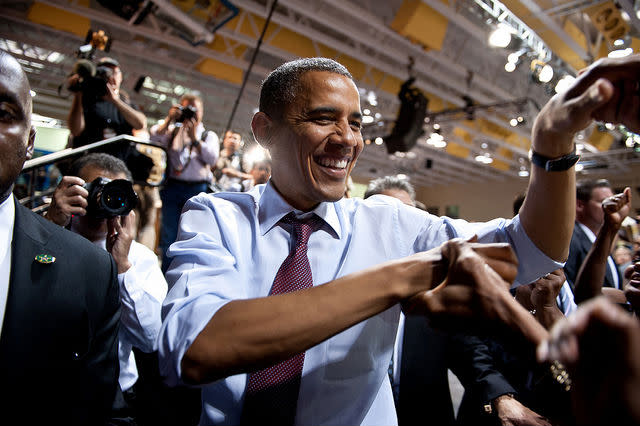Fresh off midterm losses, President Obama steps up to the bully pulpit

(credit: Flickr)
For the President and his supporters, it was an “unexpectedly good week.” On three high-profile issues—net neutrality, climate change and immigration—Barack Obama came out swinging. Has he crossed the constitutional line?
In recent years, Republicans have answered resoundingly in the affirmative. “Congress makes the laws; the president executes them,” said House Speaker John Boehner in July, explaining in USA Today the chamber’s pending lawsuit against the President over a delay of the Affordable Care Act’s employer mandate.
“That is the system the Founders gave us. This is not about executive orders. Every president issues executive orders. Most of them, though, do so within the law.”
Since the Speaker’s op-ed was published, that lawsuit has sputtered to a standstill. What’s more, Constitution Daily reported that President Obama has issued the fewest executive orders per year since President Grover Cleveland’s first time in office.
Still, accusations of an “imperial presidency” have continued, and the recent flurry of White House activity is rejuvenating the debate. Can the President really change policy in many different areas all at once?
As it turns out, while the relevant questions of politics and policy may be complicated, the constitutional consequences are less so. Let’s look at each issue in turn.
Net neutrality. Last Monday, the President came out in favor of regulating internet service providers like Verizon and Comcast as public utilities akin to telephone service rather than private information companies.
“For almost a century, our law has recognized that companies who connect you to the world have special obligations not to exploit the monopoly they enjoy over access into and out of your home or business,” Obama said in a video statement. “It is common sense that the same philosophy should guide any service that is based on the transmission of information—whether a phone call or a packet of data.”
Much as he might like to act, however, the President’s role here is essentially a political one. The Federal Communications Commission—an independent federal agency whose budget and appointments are overseen by Congress—retains full control of the rules governing the telecommunications industry.
So it falls to the five-member commission, chaired by longtime Obama supporter and former telecom lobbyist Tom Wheeler, to determine whether to take up the President’s call to reclassify ISPs under Title II of the Communications Act of 1934. While the President’s ability to exert political pressure is not trivial, it does not violate the Constitution.
Climate change. On Wednesday, while attending a meeting of the Asia-Pacific Economic Cooperation in Beijing, the President and Chinese Prime Minister Xi Jinping announced a joint agreement to reduce carbon emissions.
As part of the agreement, the United States has promised to double its current pace of carbon reduction with a 26-28 percent reduction from 2005 levels. For its part, China has agreed to keep its emission levels from growing after 2030, with an added promise of making renewable energy sources 20 percent of the nation’s energy production by that time.
Obama has already drawn enormous fire from Republicans for making the agreement. But most criticism has sprung out of economic concerns, not for an overstepping of constitutional authority.
Indeed, the understanding is that the President will turn to the Environmental Protection Agency and preexisting statutory authority to reach the new carbon goals. The Supreme Court ruled on the limits on the EPA’s authority in June, but it mostly deferred to the agency, suggesting the President will be on solid constitutional ground moving forward.
Immigration. On Friday, the New York Times reported that the President intends to announce a plan to overhaul the nation’s immigration system by the end of the year, reengaging a fight that has inspired the most opposition to his presidency.
The administration is expected to defer or erase the deportation of up to five million unauthorized immigrants, including the parents of American citizens or legal residents and residents who were brought to the country as children. Other changes may include dialing back use of the controversial “Secure Communities” program and establishing new guidelines for border law enforcement.
Since Election Day, Republicans have made clear that they will not tolerate executive action from the President on immigration. Boehner said his party would “fight the President tooth and nail,” including a possible lawsuit, and Senator Mike Lee said that “it’s very important for us to do what we can to prevent” unilateral reform.
But as Constitution Daily reported in July, when rumors of impending action on immigration were fluttering through the media, Republicans will have little to no legal recourse if any action does occur. Plus, the President retains “prosecutorial discretion” to decide when and how certain laws are enforced.
Nicandro Iannacci is a web strategist at the National Constitution Center.
Recent Stories on Constitution Daily
New Jersey reconsiders law banning cursing in front of children

